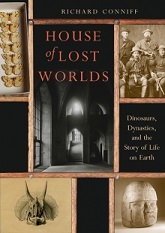
by Richard Conniff
The PBS/Channel 13 show “The Open Mind” has just aired its interview with me about my book Ending Epidemics: A History of Escape from Contagion. You can take check out the interview here or if 28 minutes is too big a commitment, take a look at the transcript below
HEFFNER: I am Alexander Heffner, your host on The Open Mind, and I’m delighted to welcome our guest today, Richard Conniff. He’s author of Ending Epidemics, A History of Escape from Contagion. Richard, thank you so much for joining me today.
CONNIFF: Thanks. Good to be here.
HEFFNER: Richard, there’s some dispute about whether three years since COVID-19 struck we’re still in what you could call a pandemic. Where do you come out on that?
CONNIFF: Yeah, I think we’re still in a pandemic in the sense that it’s going to come back again seasonally. It’s going to be global, it’s evolving everywhere, and those who aren’t protected, who haven’t gotten vaccinated will be at risk.
HEFFNER: When you titled your book Ending Epidemics: A History of Escape from Contagion, and specifically you identify epidemic, as opposed to pandemic, that was intentional?
CONNIFF: Yeah, that’s intentional. Epidemics are a lot more common. They occur regionally or in individual nations, and pandemics, where it’s the entire world are relatively rare events.
People, especially in this country take for granted our current state of health
Richard Conniff
and have no conception of the frequency of epidemic disease in our past.
HEFFNER: Take us through, in your mind, whether or not the public sufficiently understands that what we encountered in this pandemic was something that for decades and centuries, many strata of society had suffered in what you call epidemics, as opposed to pandemics. Is that fully understood or was that one of the motivations in writing this book?
CONNIFF: Yeah, I don’t think it’s understood at all. It is the reason I wrote the book that is I think people, especially in this country take for granted our current state of health and have no conception of the frequency of epidemic disease in our past and not even in our distant past. So I think I wrote it partly because I’m old. I was born in the middle of the 20th Century, and my father and my uncle both had polio. When I was five, I was in kindergarten. The polio vaccine became available for the first time. And at that point you know, what had been polio season became summer again. And two years before I was born, there was still smallpox in this country. And whooping cough was quite common. It killed 4,000 people a year in the United States. Children. I shouldn’t just say people. It was children under the age of five for the most part. Diphtheria. I live in New England, and there was a massive epidemic of diphtheria in the middle of the 18th century. Okay, I’m going back ways now, but it’s interesting because entire families, 13 children in one family just gone over a period of days. So yeah, there’s a long history of highly infectious diseases. One other example I had measles. People think measles is a trivial disease now. Doctors don’t even see measles anymore, but measles was a brutal experience about 550,000 kids had it the year I had it. 550 died. And so yeah, these are things that people don’t even think about anymore and don’t think about why we are free of these diseases.






